
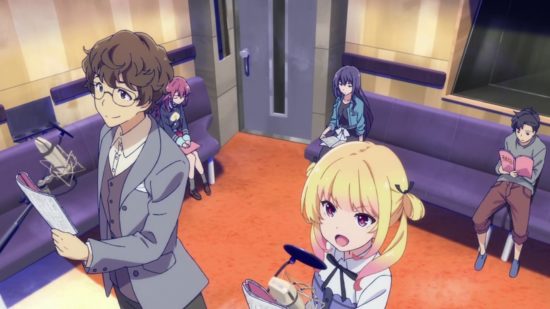
“Snark” is not highly valued in Japanese culture so it’s rare for an anime to excel in snarky satire–but Girlish Number delivers it in full and is wickedly funny (Crunchyroll.)
It’s not uncommon to have an anime series about the making of an anime series (or a manga, or video game, or whatever.) Generally it focuses on a group of idealistic young people who struggle, make mistakes and confront numerous obstacles but eventually succeed in producing something they can be proud of. Not so here. There’s no pretense that the anime series being made in this story (called “Millennium Princess x Kowloon Overlord“) is anything but crap. Though the ending of Girlish Number is more-or-less upbeat, it’s mostly because the characters have come to terms with working on a crap series.
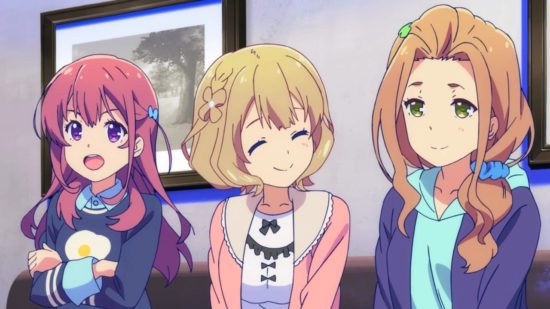
This conforms to something I’ve said before. Anime is subject to Sturgeon’s Law: “90% of everything is crap.” So if you want to work in anime, it stands to reason that most of the time you will be working on crap. But if you’re Japanese then you are expected to be 100% enthusiastic about your job, 100% of the time. That has to be somewhat draining but it turns out that it can be funny to watch.
The story centers on a group of young voice actresses who are hired to work on an anime adaptation of a light novel. It’s the standard formula about an ordinary guy from our world who gets pulled into an alternate universe where he becomes a great hero and saves the world with the help of some beautiful female warriors, yada, yada, yada.

The main character is Chitose Karasuma. At least she thinks she’s the main character because everything has to be about her. An inexperienced voice actress who has previously played only minor unnamed roles, she gets her big break when she is selected to play the lead role in Millennium Princess x Kowloon Overlord (which everyone shortens to “KuuSure“.) She thinks its because of her talent but that’s obviously not it.
Chitose is very cute but she’s thoughtless and lazy. Her worst problem is that she assumes that success is entirely a matter of talent. So either you have talent and you succeed effortlessly or you don’t have talent in which case no amount of hard work will help you.
Anime fans know that television animators typically save money by having their main characters wear the same outfits over and over. The show lampshades this by having Chitose always wear a ridiculous outfit consisting of a short red skirt and a blue top with a picture of a fried egg. She turns out to have an entire drawer full of blue tops with fried eggs.

Chitose works for a talent agency called “Number One Produce.” Also from Number One Produce is her costar, Yae Kugayama. Yae is everything Chitose is not: sweet, innocent, pure-hearted and hardworking. Of course when someone’s job is to portray sweet innocent maidens it’s always risky to assume that she’s really that way in real life, but Yae seems to be the genuine article. (Though maybe she’s not as dumb as she appears.)

Also from Number One Produce is Koto Katakura. (They’re really making out like bandits with this show.) She’s cheerful and competent, but she worries that at age 26 she’s past her prime for getting good roles.
Of course that shouldn’t make any difference for a voice actress but there may be a good reason why Kikuko Inoue always introduces herself as “I’m Kikuko Inoue and I’m 17 years old.”

Momoka Sonou is the youngest member of the cast. She’s still in high school. However she’s one of the most experienced cast members, and the most sophisticated about the industry.
As the daughter of an anime director and a famous voice actress she’s been voicing anime roles since grade school. She’s very good at it and very popular.
She appreciates that her background has given her opportunities that other people would kill for–but she can’t help looking at the other cast members and envying the normal childhood that she never got to experience.

Momoka’s friend Kazuha Shibasaki seems something of a burn-out case. In her mid-20’s she has begun to despair of ever getting a role in an anime that she can be proud of. She does her job with quiet professionalism but she can no longer bring herself to pretend to be enthusiastic about it.
After hours she tends to drink too much and starts to talk in the rural accent of her native Yamagata Prefecture.
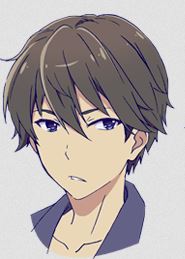
Gojou Karasuma is Chitose’s older brother. He works as an agent for Number One Produce where, conveniently, he is also her long-suffering manager. As her brother he is the only one who can speak bluntly to her about her many deficiencies, but it doesn’t seem to do much good.

At the midpoint of the series a new actress is added to the cast: Nanami Sakuragaoka. She’s another high school student who was recently signed by Number One Produce. She’s inexperienced but overflowing with enthusiasm.
She’s a massive fan of the KuuSure light novel series. She thinks the anime is brilliant. She thinks that Chitose is a great actress and is eager to learn from her.
Annoyingly, Manami seems to have a lot of native talent, plus the determination to work hard and succeed.


Producer Kuzu is, of course, the producer of the KuuSure anime. He’s a cheerful upbeat BS artist, the sort of promoter who is good at getting people to sign up for a project but has little interest in the sort of hard detail work necessary to make it succeed.
When the going gets tough you can count on him…to be out drinking at a hostess bar. Thanks to his inattention (and possibly financial malfeasance) the project is constantly on the verge of catastrophic failure.
By a strange coincidence “Kuzu” sounds like a slang term for “garbage.”

It falls to Assistant Producer Towada to clean up the messes left behind by Kuzu. Will he manage to hold things together and deliver some sort of animation to the network? Even he isn’t sure.
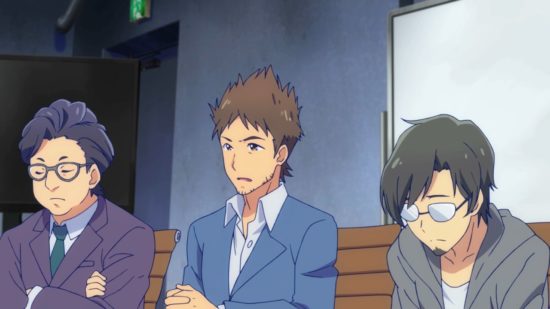

Juuzou Matsuoka is a new manager at Number One Produce. Unlike Gojou he is very athletic and brimming with enthusiasm. He’s always on the go, running everywhere and spouting inspirational exhortations.
In short he’s totally annoying.

President Namba is the head of Number One Produce. He’s a bluff hearty man who, like Kuzu, doesn’t give a hoot about delivering high-quality entertainment. All he cares about is making money.
However he’s smart enough to know that he will only make money if the actors he represents have successful careers. Beneath his jolly facade he pursues that end relentlessly, making use of his many industry contacts and a deep understanding of human nature.
 “Sensei”, the author of the KuuSure light novel series, wanders around in a daze of depression, rarely uttering more than a couple of sylables. His dreams of writing deathless prose are drifting away. All he has managed to write is an uninspired derivative series that the fans for some reason adore. Now it is turning into an anime series that is just plain awful.
“Sensei”, the author of the KuuSure light novel series, wanders around in a daze of depression, rarely uttering more than a couple of sylables. His dreams of writing deathless prose are drifting away. All he has managed to write is an uninspired derivative series that the fans for some reason adore. Now it is turning into an anime series that is just plain awful.
Meta alert: Girlish Number was created by Wataru Watari, the author of the popular light novel series My Teen Romantic Comedy SNAFU, which was adapted into a successful anime series (Crunchyroll.)
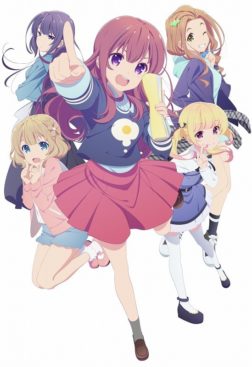
“Millennium Princess X Kowloon Overlord” is of course a parody of overly long and stupid light novel titles, of which there are far too many to list here.
It sounds even stranger in Japanese, where “九龍覇王と千年皇女” is read as “Kuuryuu Haou to Sennen SUREBU“. The characters for “Imperial Princess” (皇女, normally pronounced “koujo“) are for some reason pronounced like the English word “slave” (or “surebu” which is as close as you can get to that using Japanese characters.) Hence the “sure” in “KuuSure“.
Also “Millennium” (千年) could be read as “Chitose” and usually is when used as someone’s name. So “Millennium Princess” = “Chitose Slave.”
Which I guess means that she was fated to get that role.
Aaron Magulick explains some of the darker jokes here: “OreGairu Creator’s Girlish Number Tells The Harsh Truth About The Anime Industry.”

